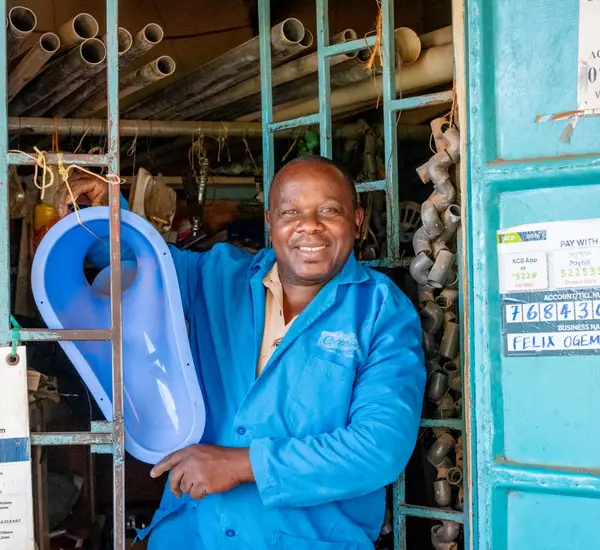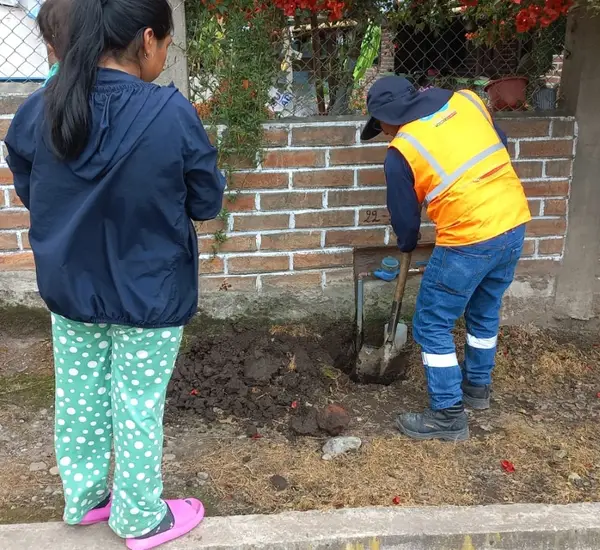
Marian Siljeholm/USAID Western Kenya Sanitation Project
Since the Water for the World Act was unanimously passed in 2014, USAID has led the charge in improving global water security, helping 42 million people access clean water and 38 million people gain essential sanitation services. We're proud to support USAID and other development partners in these critical efforts by implementing water, sanitation, and hygiene (WASH) programs in collaboration with local municipalities, private sector companies, schools, health clinics, and communities worldwide.
As we celebrate the 10th anniversary of the Water for the World Act, here are 10 ways we’re supporting global water security.

1. Championing Market-Based Sanitation Solutions
In Western Kenya, many communities lack safe sanitation options. Felix Ywaya, a small grocery store owner in Kakamega County, grew his business by expanding to offer sanitation products and installation materials like pipes. Through the USAID Western Kenya Sanitation Project, we help entrepreneurs like Felix create lasting change in their communities through businesses that provide affordable sanitation solutions.

2. Reducing Water-Related Conflicts
In Ethiopia’s rural lowlands, drought and poor water management are fueling local conflicts. Through the USAID Ethiopia Climate Resilient WASH Activity, we’ve partnered with local entities like the Rural Agency for Community Development and Assistance (RACIDA) to develop and test a conflict resolution strategy. In this strategy, we are integrating RACIDA’s approach on community engagement and participatory planning to enhance water resource management, strengthen conflict resolution mechanisms, promote community engagement and cooperation, and build stakeholder capacity on conflict resolution, water management, knowledge sharing, and resource mobilization.

3. Enhancing WASH Systems Governance
Effective, inclusive, and citizen-responsive public services are a core objective of Ecuador’s decentralization and development goals. Through the USAID Tu Municipio Responde Activity, we’re helping municipalities and water and sanitation service providers in Ecuador apply good governance principles to water and sanitation management. Increased transparency, citizen engagement, participatory planning, and accountable monitoring will build citizen trust, generate more public revenue, and improve public services.

4. Advancing Cross-Sectoral Goals in Health and WASH
Improving access to WASH services is vital for health systems strengthening and sustainable development. Through the USAID Owod “Being Healthy” project, we’re bringing clean water and improved sanitation to health clinics in Senegal, including constructing a new borehole that helped improve healthcare and hygiene for 23,000 patients at the Bounkiling health center. Meanwhile in Cambodia, the USAID Integrated Early Childhood Development Activity is partnering with local water operators and latrine business owners to increase access to their services, including through targeted pro-poor initiatives, to improve health outcomes of young children by reducing waterborne diseases.

5. Enabling WASH Sector Reform
Local governance is the foundation for strong water and sanitation services. In Nigeria, we collaborated with 17 civil society organizations and reform champions to pass water sector laws and policies for the first time in five states. These states now have a solid foundation for reforming their utilities and regulations and promoting accountability and transparency to ultimately improve WASH service delivery.

6. Strengthening Water Resources Management with Evidence
Climate change and competing demands are stressing water resources. To help the Philippines better manage this precious resource, the USAID B-LEADERS Project developed a framework for determining water availability scenarios and trade-offs for food, water, and energy uses. In India, RTI is developing a forecasting solution to optimize river basin planning and decision-making.

7. Integrating Gender Equity in WASH
Removing barriers and integrating gender equity into the WASH sector can expand access to WASH goods and services. Through the Water for Women Fund in India, we developed a WASH market in Odisha and Rajasthan with community- and women-led business models and public-private partnerships. Women users now have a WASH market that considers their safety and comfort as well as opportunities to participate through microenterprises.

8. Placing Innovation in Sanitation Management Front and Center
Sanitation management is a global priority, and public and private sector players are adopting and adapting technologies that can advance it. With the Gates Foundation and commercial clients, we’ve supported technology scouting, commercialization, development, testing, and scaling. Innovations include toilets that turn waste into fuel, sensors for water monitoring, and new sanitation market systems.

9. Expanding Urban WASH Services Delivery
Exponential urban growth, aging infrastructure, and climate change stress urban WASH services. Through the USAID Effective WASH Services program in Nigeria, we supported urban utility strengthening including management reform, customer engagement, innovative billing, asset management, and infrastructure rehabilitation. The country has re-opened an idle water treatment plant and installed infrastructure to serve over 200,000 more customers.

10. Advancing Menstrual Hygiene Management Equity
Many women and girls lack quality, safe menstrual hygiene products in countries like Kenya, making it difficult to go to school or work when menstruating. Through the USAID Western Kenya Sanitation Project, we trained motorcycle taxi drivers to distribute sanitary products and information. The drivers make income from the sales while helping empower more women and girls with menstrual health knowledge and resources.
Visit RTI’s WASH page for more information on these projects and more.
